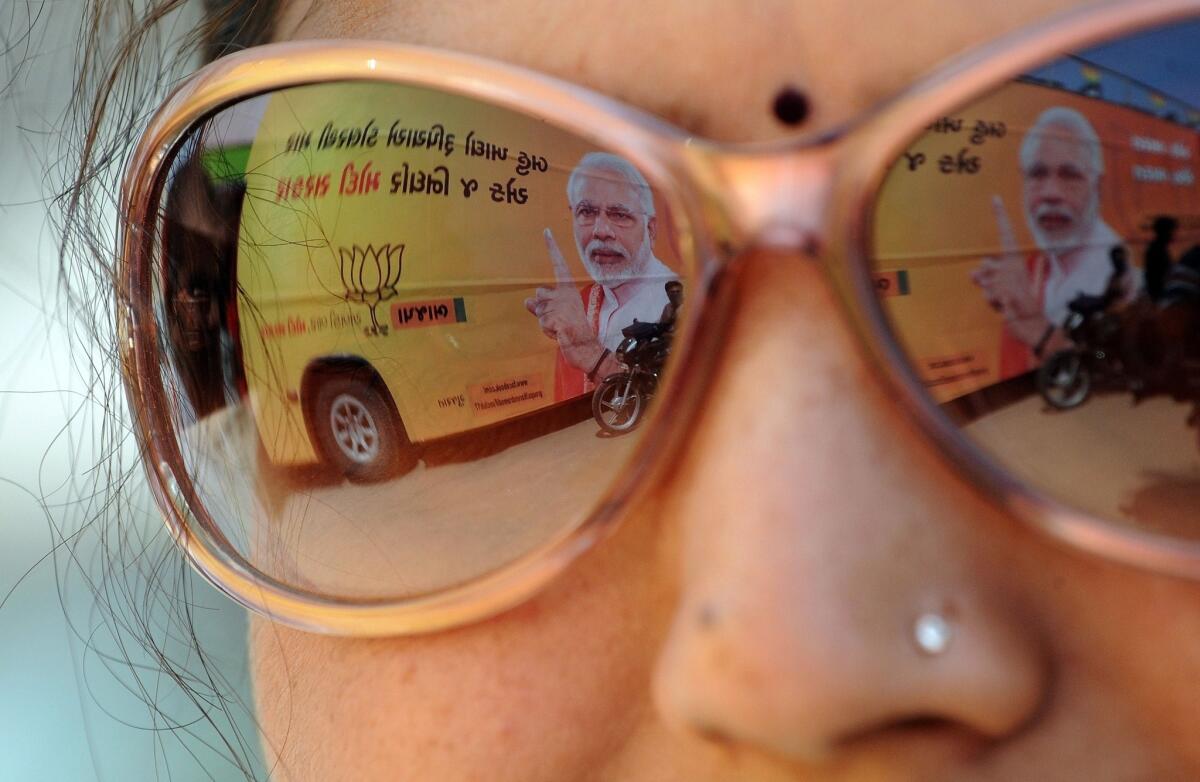Pakistanis in disputed Kashmir worry about rise of Indian nationalist

- Share via
reporting from GILGIT, Pakistan — The rugged, snow-laced beauty of the Himalayan countryside masks a creeping sense of worry about political developments taking place far below these mountains.
In neighboring India, Narendra Modi, a conservative Hindu nationalist with a history of bellicose rhetoric on Pakistan, is poised to become prime minister, raising concern about renewed strife between the nuclear-armed rivals.
Many Pakistanis will be closely watching Friday’s election results in India, but perhaps nowhere more than in Gilgit-Baltistan, in the Pakistan-controlled section of the disputed region of Kashmir. Home to the world’s second-highest peak, K2, it is a land of mighty glaciers and serene valleys wedged among India, China and Afghanistan.
Both India and Pakistan lay claim to Gilgit-Baltistan. The last major battle between the two, in 1999, was centered on the Indian town of Kargil, along the Line of Control that divides the territory from the India-held part of Kashmir. Each country maintains several thousand troops in a standoff on the Siachen Glacier, at 22,000 feet above sea level on the eastern edge of Gilgit-Baltistan.
“We fear that the cease-fire on Siachen could be hurt with Modi coming to power,” said Taqi Akhunzada, an activist in the town of Skardu with Pakistani Prime Minister Nawaz Sharif’s party. Akhunzada said that no one had forgotten the fighting in Kargil, in which each side lost hundreds of soldiers, saying, “We pray a similar conflict would not erupt.”
Since gaining independence from Britain in 1947 and splitting along religious lines, predominantly Hindu India and mostly Muslim Pakistan have fought three wars and conducted tit-for-tat nuclear tests in 1998 that briefly raised the specter of nuclear war. The countries have taken steps to increase bilateral trade, which totals $2.6 billion a year, but progress has slowed because of long-standing disputes over Kashmir and terrorism, with Pakistani militant groups frequently accused of carrying out attacks on Indian soil.
Modi, who climbed the ranks of a right-wing Hindu organization and has earned a reputation as a no-nonsense administrator while serving as chief executive of the western state of Gujarat, has said he would deal firmly with cross-border terrorism. But he has also been dogged by accusations that he is a religious fundamentalist who failed to stop a 2002 pogrom in his state that killed more than 1,000 people, mostly Muslims.
A year ago, asked how he would have responded to the 2008 attacks by Pakistan-based terrorists in the Indian city of Mumbai, Modi told a television interviewer with bravado: “I would have done the same thing I did in Gujarat.... Pakistan should be answered in the language they understand.”
Modi the candidate has softened his rhetoric. Last month he said, “I believe mutual respect for one another and cooperation should be the basis for relationships with foreign nations.”
India has long worried about militant groups operating in the Pakistan-held portion of Kashmir. Activists in Gilgit-Baltistan said that a more aggressive Indian foreign policy could further upset the tenuous status quo here and delay long-sought reconciliation measures, such as opening the border crossing at Kargil, a move that would allow visits between relatives separated by the Line of Control.
Raja Shah Sultan Maqpoon, editor of K2, the largest newspaper in the region, said that if Modi came to power, “dialogue between India and Pakistan would have to start from square one.”
The territory remains in limbo: It is theoretically self-governed, but its elected officials report to the Pakistani prime minister in Islamabad, giving residents little control over local issues. Periodic multi-day demonstrations against Islamabad’s policies, such as those in April, have drawn thousands of protesters.
It is also the site of growing geopolitical tension between India and China, which has invested heavily in trade and development projects, including the Karakoram Highway linking it with Pakistan. India opposes such development on what it calls disputed land, and some residents believe that Modi would try to block construction of the Diamer-Bhasha dam, a 4,500-megawatt hydropower project that would help shore up Pakistan’s failing energy sector.
“He has a history against Muslims in India,” said Shahabuddin Ghauri, a 30-year-old resident of the Diamer district. “We should not expect good for Pakistani Muslims from him.”
Some senior Pakistani officials, however, were quietly hopeful that a strong electoral showing by Modi’s Bharatiya Janata Party will give him a mandate to improve relations. The last time the party led India, Prime Minister Atal Behari Vajpayee reached out to Pakistan and the two sides signed the 1999 Lahore Declaration, a landmark nuclear control treaty. His counterpart was Sharif, who returned to power in Pakistan last year.
“Modi has talked about the influence of Vajpayee on his thinking,” said Sameer Patil, a security analyst with Gateway House, an Indian think tank. “They don’t want to disown that legacy.”
The momentum from the Lahore pact was lost, however, when the Kargil conflict erupted that year. Since the 2008 Mumbai attacks there has been scant improvement in relations, and few expect an immediate breakthrough.
“We have no view” on a potential Modi prime ministership, the Pakistani envoy to New Delhi, Abdul Basit, said in an interview. “We will be willingly and readily engaging with the new government.”
Special correspondent Sahi reported from Gilgit and Times staff writer Bengali reported from Mumbai, India. Special correspondent Parth M.N. in Mumbai contributed to this report.
More to Read
Sign up for Essential California
The most important California stories and recommendations in your inbox every morning.
You may occasionally receive promotional content from the Los Angeles Times.














